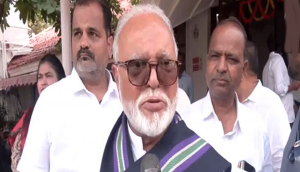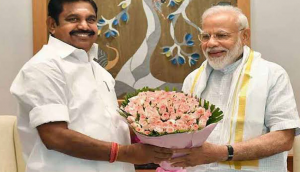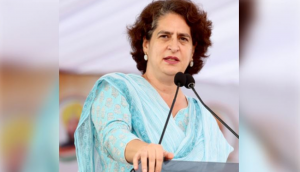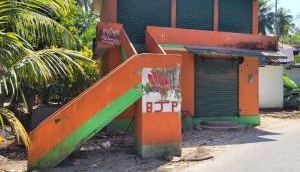ED raids to ABVP protests: Why does BJP trigger conflicts before Parliament sessions?

Politics of crackdown
- ED raid on Virbhadra before Winter Session miffed Cong
- The Opposition remained angry; Winter Session was a washout
This time \'round
- Budget Session is a week away
- The Opposition is coming together on the JNU issue
More in the story
- Will the Budget Session work?
- Does the BJP want the Opposition to scuttle Parliament?
When the Union government is besotted with several shortcomings on fronts ranging from economy to national security and even democratic freedom evading parliamentary scrutiny gives it a perfect advantage. Is that the reason why the government has been using multiple resources at its disposal to trigger Opposition unrest just before the convening of Parliament for two straight sessions now?
In November, the Congress was riled at Enforcement Directorate-raids against Virbhadra Singh. The raids on 20 November were just six days before Parliament's Winter Session. The session was a washout.
Once again, as the Budget Session is just around the corner, set to begin from 23 February, the government has whipped up a fresh controversy. What might have ended as a nondescript commemoration of the hanging of Parliament attack-convict Afzal Guru, has become a full-fledged socio-political battle.
The decision of the Akhil Bharatiya Vidyarthi Parishad (ABVP) to oppose the event in large numbers undoubtedly had the sanction of the Bharatiya Janata Party and the Sangh Parivar brass.
Home Minister Rajnath Singh's orders to the Delhi Police and the Central Reserve Police Force to send personnel within the campus further showcase the government's efforts to whip up sentiments.
Singh's culpability doesn't merely end at ordering police action. He even raised the bogey of Jama'at-ud-Da'wah chief Hafiz Saeed supporting the pro-Afzal Guru event. BJP chief Amit Shah wrote an exaggerated blog post, accusing Congress vice-president Rahul Gandhi of conspiring with separatists to partition the country once again.
What has given the situation a deplorable turn is the attempt to physically attack Opposition leaders assembled in JNU to express solidarity with the students against police action. Deputy leader of Opposition in the Rajya Sabha Anand Sharma was attacked inside the JNU campus on 13 February. Congress spokesperson Randeep Surjewal alleged Sharma was "attacked with a sharp-edged weapon by government protected ABVP goons".
Sharma was accompanied by Rahul Gandhi, who was taken away to safety by the Special Protection Group as its personnel feared he could be attacked too. Sharma claimed that his attackers had surrounded Rahul's vehicle.
The Congress issued a statement saying it was "a black day" for the country's democracy. The party also called for an explanation to the nation from the Shah and Prime Minister Narendra Modi.
This episode further dented an already strained relationship between the government and Opposition. The Congress is quite likely to attack the government over it in Parliament. One can almost envisage a repeat of familiar scenes of acrimony, Parliament getting stalled and once again government getting away with doing little parliamentary business.
In the last year-and-a-half, the Opposition has, of course, shown that it has chosen to use Parliament as a weapon to assault the government, rather than expose its failings through the parliamentary mechanisms available.
Also read: You can arrest us, hang us but you can't silence us: Shehla Rashid, JNUSU
However, the government, in this case, appears to be helping the Opposition so that the inconvenience of parliamentary consensus can be done away with. This allows the government a free hand in running the country through the executive machinery, largely escaping legislative scrutiny.
Congress spokesperson Ajoy Kumar told Catch that the Rashtriya Swayamsevak Sangh was not in favour of the Good and Services Tax bill and believes that having the Parliament stalled will give the government the perfect excuse to defend its inability in implementing it.
Kumar also said the the government was trying to divert public attention from itst failures, especially on the economic front.
"The RSS has realised that this government is run by its political arm, which has been unable to deliver on all governance issues. So, it has decided to go back to its auto mode of politics of polarisation, perfected by Prime Minister Narendra Modi and Amit Shah in Gujarat," Kumar said.
According to CPI(M)'s Mohammad Salim, too, the JNU episode was triggered because the Budget Session is about to turn the focus on economic issues such as low investment in the economy, poor manufacturing activity, excise duty on petro-products and its cascading effect on price rise, unemployment, agrarian distress, food security act, the rising cost of healthcare and import duty on life-saving drugs.
Besides, issues like the Hyderabad University and FTII would also be raised, he added.
"The government wants to evade scrutiny on these issues. Their strategy is to create new problems since they can not solve the existing ones. The JNU episode reflects their core political ideology of presenting their opponents as anti-national. But its a failure of their parliamentary strategy. They are uniting the opposition against them," Salim said.
According to JD(U)'s KC Tyagi: "what happened at JNU reminds one of the days of the Emergency when anybody with views different from the government was jailed." Alluding to the BJP's current top leadership, Tyagi said avoiding the legislature is their old strategy.
"In Ahmedabad under Modi, the state Assembly never ran for even a week. There were occasions when the entire Opposition was thrown out. But this is not Gujarat. We have seen the Emergency as well as single-party rule. We will fight this out."
These statements are ominous signs for the budget session. The opposition will be better advised to let the session go on and corner the government on the floors of the two Houses. However, it appears, as of now that the provocation has worked and the Opposition's agenda for the session is set.
Edited by Joyjeet Das
Also read: #JNUCrackdown: You don't mess with a nationalist like BJP MLA OP Sharma
First published: 16 February 2016, 10:14 IST






![BJP's Kapil Mishra recreates Shankar Mahadevan’s ‘Breathless’ song to highlight Delhi pollution [WATCH] BJP's Kapil Mishra recreates Shankar Mahadevan’s ‘Breathless’ song to highlight Delhi pollution [WATCH]](https://images.catchnews.com/upload/2022/11/03/kapil-mishra_240884_300x172.png)

![Anupam Kher shares pictures of his toned body on 67th birthday [MUST SEE] Anupam Kher shares pictures of his toned body on 67th birthday [MUST SEE]](https://images.catchnews.com/upload/2022/03/07/Anupam_kher_231145_300x172.jpg)






